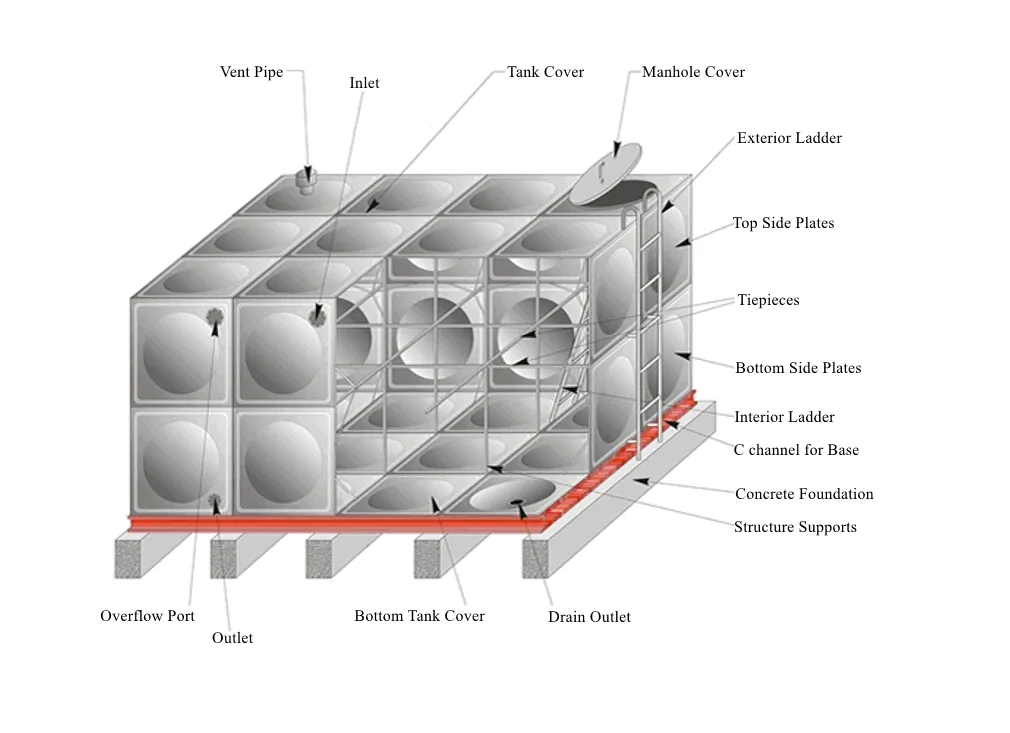loading...
- No. 9, Xingyuan South Street, Dongwaihuan Road, Zaoqiang County, Hengshui, Hebei, China
- admin@zjcomposites.com
- +86 15097380338
- Welcome to visit our website!
frp water storage tank
FRP Water Storage Tanks The Future of Water Management
Water is an essential resource for life, industry, and agriculture. As the global population continues to grow and the demand for clean water increases, efficient water management has become a priority. One innovation that has gained attention in recent years is the use of Fiber Reinforced Plastic (FRP) water storage tanks. These tanks offer numerous advantages that make them an ideal choice for both residential and commercial water storage needs.
Understanding FRP
FRP, or Fiber Reinforced Plastic, is a composite material made of a polymer matrix reinforced with fibers, typically glass or carbon. This combination provides remarkable strength-to-weight ratios, corrosion resistance, and durability. The properties of FRP make it particularly suitable for storing water, as it can withstand a variety of environmental challenges without risking contamination or structural failure.
Advantages of FRP Water Storage Tanks
1. Corrosion Resistance Traditional water storage tanks made from steel or concrete are prone to corrosion and degradation over time. FRP tanks, on the other hand, are highly resistant to corrosive substances, ensuring longer service life and reduced maintenance costs.
2. Lightweight Construction The lightweight nature of FRP makes these tanks easier to transport and install compared to their metal or concrete counterparts. This is a significant advantage in areas with difficult access or where transportation logistics are a challenge.
frp water storage tank

3. Durability and Strength FRP tanks are designed to withstand extreme weather conditions, including high winds and heavy rainfall. Their structural integrity ensures that they maintain their shape and functionality under stress, making them a reliable choice for long-term water storage.
4. Customizable Designs FRP water storage tanks can be customized in size, shape, and capacity to meet specific requirements. This flexibility allows for effective water management solutions, whether for residential, agricultural, or industrial applications.
5. Reduced Environmental Impact FRP materials can be manufactured with lower energy consumption compared to traditional tank materials. Additionally, because they are resistant to corrosion, they do not leach harmful chemicals into the water, thereby safeguarding water quality.
Applications of FRP Water Storage Tanks
FRP water storage tanks can be utilized in a variety of settings. In residential areas, they serve as rainwater harvesting systems, providing an eco-friendly source of water. In agriculture, they are essential for irrigation and livestock watering, helping farmers optimize water use. In industrial settings, these tanks are used for chemical storage and wastewater treatment, supporting safe and efficient operations.
Conclusion
As we address the growing challenges of water scarcity and quality, FRP water storage tanks emerge as a practical and innovative solution. Their unique combination of strength, corrosion resistance, and lightweight design makes them an excellent choice for a wide array of applications. Investing in FRP technology not only contributes to effective water management but also supports sustainable practices that benefit our environment and future generations. As we move forward, embracing these advancements in water storage solutions will be crucial in ensuring access to clean, reliable water for all.
-
The Rise of FRP Profiles: Strong, Lightweight, and Built to LastNewsJul.14,2025
-
SMC Panel Tanks: A Modern Water Storage Solution for All EnvironmentsNewsJul.14,2025
-
GRP Grating: A Modern Solution for Safe and Durable Access SystemsNewsJul.14,2025
-
Galvanized Steel Water Tanks: Durable, Reliable, and Ready for UseNewsJul.14,2025
-
FRP Mini Mesh Grating: The Safer, Smarter Flooring SolutionNewsJul.14,2025
-
Exploring FRP Vessels: Durable Solutions for Modern Fluid HandlingNewsJul.14,2025
-
GRP Structures: The Future of Lightweight, High-Performance EngineeringNewsJun.20,2025
